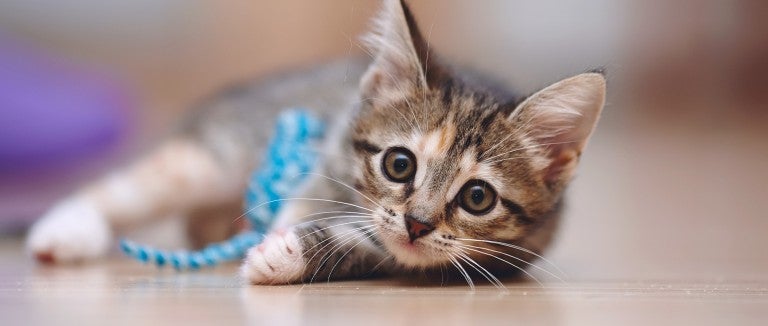A kitten's life is all about play ... and play is all about prey. Kittens start to play when they are a few weeks old. If you look closely, you'll notice that you now have an itty-bitty hunter in your house.
Learning to play nice
Kittens learn to control how hard they bite from their mothers and littermates. A kitten who is separated from their family before two or three months of age may not have learned appropriate play behavior, leading to unwanted nipping. Kittens also learn acceptable play from humans: if people use their hands and feet instead of toys to play with a young kitten, the kitten may learn that hands and feet are play objects—which is cute when they’re kittens, but painful when they’re adults. Consistency is key. Everyone in the household must be on the same page: your kitten can't be expected to learn that it's okay to play rough with certain people but not with others.
Sign up to receive our exclusive e-book full of important information about caring for your pet, including training techniques and answers to frequently asked questions.

In most cases, it's easy to teach your kitten or young adult cat that rough play isn't acceptable. Follow these tips to keep playtime fun:
- Play with your kitten at least two to three times a day (ideally for 15 minutes at a time) using interactive toys. These are toys that you move and they chase. The most common interactive toys are fishing pole-type toys with feathers attached to a long piece of string, wand toys with a long, narrow piece of cloth attached to a pole and cat laser lights. Keep in mind that when cats are playing they think they are hunting, so move the toy as if it is prey, moving it away from the kitten or across their field of vision. Sometimes the most interesting part of the play for the kitten is when the toy is not moving and they get to stalk and then pounce. Establishing a routine of feeding after the play session will help the kitten to relax post-meal and get them out of play mode.
- Make sure your kitten has various toys to play with. While stationary toys are not a substitute for interactive play, it’s important that your kitten has appropriate objects they can play with when not playing with you. For example, a plush toy, like a stuffed animal, is fun for the kitten to wrestle with. This is one of the ways kittens play with each other and how they're trying to play with us when they grapple with our feet and hands, so it's important to provide this type of alternative. A ping-pong ball to bat around the home can also be a great source of amusement. Make sure to rotate the toys. The same toys lying around all the time become boring for cats. It’s better to have a few toys that you rotate then numerous toys all over the floor.
- Kittens love to explore new objects. Paper bags and cardboard boxes are particularly fun!
- If you are doing all of the above and your kitten consistently nips or pounces on you, simply walk away and end the interaction when they show this behavior. With consistency, the kitten will learn that nipping/pouncing leads to a loss of attention and it’s not in their self-interest to do this behavior.
- Do not hit or yell at your kitten when they nip or pounce. They have no concept that they are doing anything wrong and this behavior will lead them to fear you. The idea is to train them, not punish them, and to make sure their energy needs are met on a daily basis.
